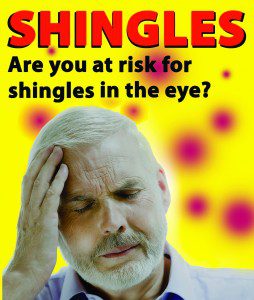

Shingles in the eye! That’s what is wrong.
Most people don’t ever think of their eyes getting shingles. But it is something that we see every day in our eyecare practice. And when it is in the eye, it can be very dangerous and put you at risk for vision loss.
What is Shingles?
Just like you’ve heard again and again on those TV commercials…..Shingles is caused by the varicella zoster virus, the same virus that causes chicken pox. Anyone who had chicken pox is at risk for developing it.
What are the Symptoms of Shingles?
Often shingles will start with a ‘feeling’…. a subtle burning, swelling, itching or tingling on only one side of the body. It is hard to diagnose at that point, especially if it is in the eye. Once the rash of fluid filled blisters appears, it is easy to confirm the condition. Shingles can be anyplace on the body but the most common area is the torso around the waist, and the second most common is the face and eye. Often we will see the first blister on the tip of the nose.
How is Shingles in the eye different?
Over a million US citizens will get shingles, and 10 to 20% of them will get it in or around the eye. Shingle skin lesions are very painful, but when you develop shingles in the eye, called herpes zoster ophthalmicus, you are at risk for vision loss.
Unlike most conditions, shingles can affect every part of the eye. We often see corneal abrasions, ulcers, inflammation of the cornea, glaucoma induced by shingles, and even retinal damage in patients with shingles. The good news is that if we see the patient in the early days of the outbreak, we can successfully treat them. Only rarely do we see a patient with permanent vision loss.
Who gets Shingles?
As we age, our immune system gets weaker and can also be compromised by medications, illnesses, and stress. These things cause an increased risk for developing shingles. It is estimated that 1 in 3 Americans will get shingles at some point in their lifetime. It is also more prevalent in women.
What can you do about Shingles?
1) Prevention is always the best treatment. We recommend that our patients 60 and older get the vaccine.
2) If you develop shingles, it is important to seek treatment as soon as possible. At The Eye Associates, we will put a shingle patient in an ‘emergency’ spot so that they can be seen quickly.
3) And of course, you must take all medications as prescribed. Shingles is nothing to mess around with.
Is Shingles Contagious?
Even though shingles can be shocking to look at, it is not contagious. But there have been cases when a child that has never had chickenpox comes into contact with an open lesion, then the child will develop chickenpox; not shingles.
Can Shingles Reoccur?
It doesn’t always reoccur, but unfortunately it can. It is most likely to happen if you have a weak immune system or if you take medications that suppress your immune system. Also, shingles can reoccur even if you have had the vaccine. There are no guarantees.
Richard E. Hector, MD
Robert S. Friedman, MD
Cathleen McCabe, MD
Brian Foster, MD
Todd Berger, MD
Jeffrey Kasper, MD
Prabin Mishra, MD, PhD
Scott B. Han, OD
Michael Camp, OD
Edwin Detweiler, III, OD
Mary Jo Baize, OD
Lori Ann Long, OD
Toll Free: 1-866-865-2020
www.Sight4Life.com
WEST BRADENTON:
6002 Pointe West Blvd
(1 block south of Blake Medical Center
off 59th St West)
EAST BRADENTON:
7230 55th Avenue East
(12 Oaks Plaza at SR 70 & I-75)
ELLENTON:
7915 US Hwy 301 North, # 101
(Harris Professional Center,
corner Hwy 301 N & 80th Ave E)
SARASOTA:
2111 Bee Ridge Road
(South of Southgate Mall off US 41)
SUN CITY CENTER:
3894 Sun City Blvd
(on SR 674 across from Burger King)
WEST BRADENTON:
Dermatology & Hearing only
2101 61st Street West
 Southwest Florida's Health and Wellness Magazine Health and Wellness Articles
Southwest Florida's Health and Wellness Magazine Health and Wellness Articles

